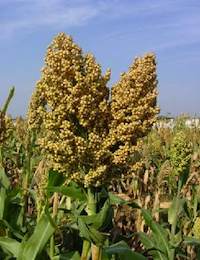In 2010 biomass and sugar testing programs, Chromatin sorghum hybrids have demonstrated top performance when compared to other materials from public, private and commercial sorghum collections. This according to a company press release. Chromatin is a biotechnology company and its subsidiary, Sorghum Partners, LLC, sells sorghum seed products to growers.
 Several trials were conducted. In the first trial, 50 biomass sorghum hybrids were planted in four replicate plots and tested for total yield, moisture, energy, and ash content. In a second trial, Chromatin tested 50 types of sweet sorghum, measuring total biomass yield and fermentable carbohydrate in harvested juice. The results of the trials have indicated that Chromatin’s hybrids provide the three top-yielding biomass sorghum hybrids. In addition, these hybrids also demonstrated very high energy content (BTU’s), low ash content and low moisture retention. Another notable characteristic – several of the company’s hybrid’s generated more fermentable sugar per acre than many of the competitors.
Several trials were conducted. In the first trial, 50 biomass sorghum hybrids were planted in four replicate plots and tested for total yield, moisture, energy, and ash content. In a second trial, Chromatin tested 50 types of sweet sorghum, measuring total biomass yield and fermentable carbohydrate in harvested juice. The results of the trials have indicated that Chromatin’s hybrids provide the three top-yielding biomass sorghum hybrids. In addition, these hybrids also demonstrated very high energy content (BTU’s), low ash content and low moisture retention. Another notable characteristic – several of the company’s hybrid’s generated more fermentable sugar per acre than many of the competitors.
“These results are highly significant,” said Dave Jessen, Chromatin’s CTO. “With a range in the biomass testing program of 18.8 to 4.3 dry tons per acre (entry mean = 10.6), we are very confident that our best materials will deliver superior biomass yields. Further, two of our sorghum hybrids have sugar yields per acre that surpass many sweet sorghum cultivars that are used today.”
While the test were conducted in small scale, Jessen is confident that the company’s hybrids will still perform as well on larger scale tests.
“These tests show that our biomass has a combination of qualities that are high priority for thermochemical processors, and that our sweet sorghum provide solutions that can meet today’s growing demand for soluble sugar,” said Daphne Preuss, CEO of Chromatin. “BTU values ranged over $1000 / acre between the biomass at the extremes in the trial. This clearly shows that a key economic driver for cleantech projects will be the ability to access a high-performance feedstock.”

